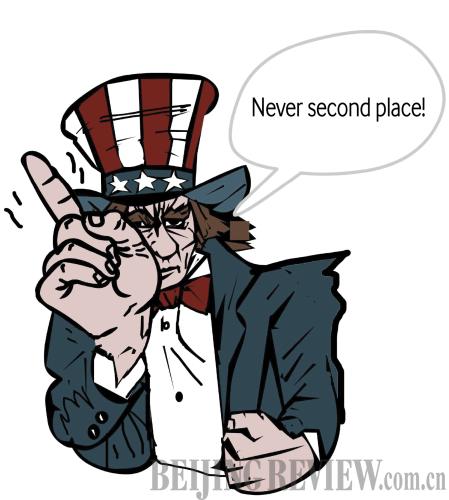Learning to be number two
- By Jon R. Taylor
 0 Comment(s)
0 Comment(s) Print
Print E-mail Beijing Review, December 19, 2013
E-mail Beijing Review, December 19, 2013

Kishore Mahbubani, author of The Great Convergence: Asia, the West, and the Logic of One World, posed two questions to four U.S. politicians—two Republicans and two Democrats—who were part of a panel discussion that he chaired at the Davos World Economic Forum in 2012. The first question: "What do you see as the future of American power?" The second: "Could America adjust to being number two in the world?" Mahbubani expressed shock when he observed the unvarying reactions among the four politicians to the two questions that he posed: that America would always remain number one. More importantly, none of them could say or imply that the United States could ever be number two. Mahbubani noted that judging from their responses, it was clear that "America as number one is sacred."
Quite frankly, Mahbubani shouldn't have been that surprised, given U.S. President Barack Obama's statement during his 2010 State of the Union address: "I do not accept second place for the United States of America." While Obama and other American politicians may not be willing to accept second place, it does not mean that it is not happening. In 2012, China surpassed the United States to become the world's biggest trading nation as measured by the sum of exports and imports of goods. It is a harbinger of things to come: China will likely pass the United States as the world's largest economy by the time that the Communist Party of China celebrates its centennial in 2021. And if Hu Angang, a professor at the School of Public Policy and Management, Tsinghua University, is correct in his new book China 2030, China's economy will become twice as big as that of the United States and larger than both the United States and the European Union combined by 2030.
About a year ago, The Economist wryly observed that when "the idea that China has overtaken the United States as the world's largest economy, the psychological impact on Americans, policymakers and citizens alike, is certain to be significant." Observations regarding American primacy span the U.S. political spectrum and are quite telling, primarily because they play upon the parochial fears of China among the American people—fears that are as often whipped up by the U.S. news, media and entertainment industries as they are by politicians. It was evident during the 2012 U.S. presidential election and it is evident today within the U.S. Congress.
Many of America's political leaders and policy shapers appear to engage in an exercise of willful reluctance by refusing to accept the reality that sometime within the next five to 10 years China will surpass the United States and become the world's largest economy. But, it is possible that the American public is ahead of their politicians and policy shapers in perceiving that a change is coming. A recent survey conducted by the financial website The Street asked Americans which country is currently the "world's dominant economic power?" The result: 28 percent of those polled chose China, while 59 percent chose the United States. However, the survey also asked respondents to look ahead five to seven years. The finding was revealing—and demonstrated much less confidence in America's position. By 2018 to 2020, 36 percent said China would be number one, while only 43 percent of Americans believed that the United States would be the world's "dominant economic power."






Go to Forum >>0 Comment(s)